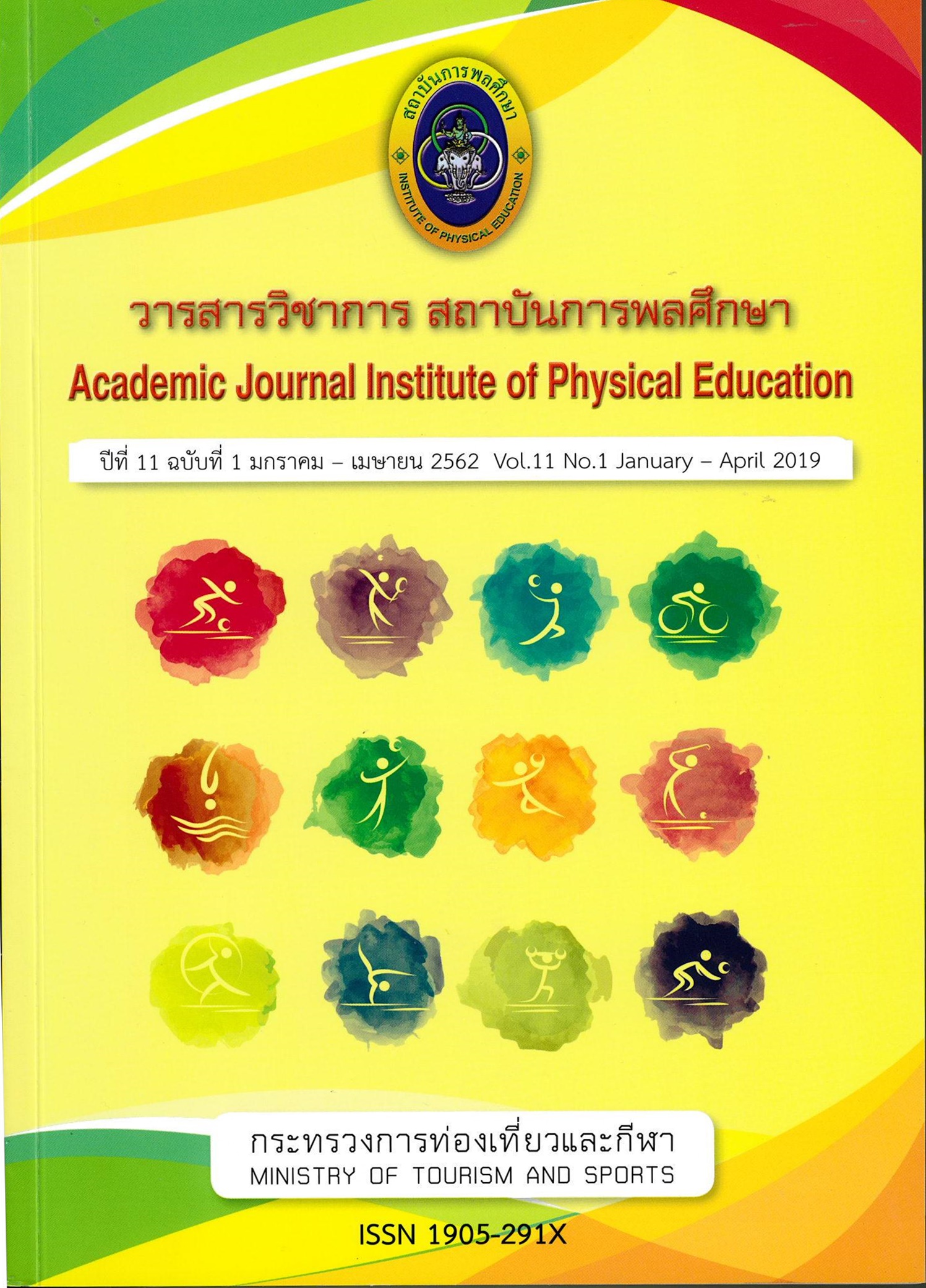WOMEN LEADERSHIP DEVELOPMENT IN SPORTS ORGANIZATION
Main Article Content
Abstract
The research objective waso study the importance of the role and leadership of female leader and the factors resulting in the female leadership. The data helps to create the solution in development of female leadership in Thai Sport Organization.
This research’s method wasualitative and descriptive research. The data had een collected and analyzed by Questionnaire and Delphi technique. During the operation, they are monitoring and inspecting the content validity of the questionnaire by using the IOC (Index of Item-objective congruence). The result shown that there were 5 specialists who have a complete reliability to the entire questionnaire which can be evaluated to 0.791.
The result conveyedhat the importance of the role in female leader in Sport Organization was still in a good level. However, the networking is still the problem that female leader in Sport Organization needs to be improved. The result also reveals the good level of the leadership in female leader in Sport Organization. Yet, there are some topic which needs to be enhanced such as the self- esteem improvement and sport expertise. Moreover, the data shows that there are 5 factors resulting in the female leadership including management skill, visionary leader, strong personality, trustworthiness and high experience.
The solutions of Women Leadership Development in Sports Organization can be described as 3 stages. First, the most important stage is the motivation which requires 2 factors to be accomplished: strong self-esteem and good organizational culture. The next state is high proficiency. An efficient leader, especially woman, needs to accomplish 4 ways of proficiency which are strong personality, reliability, emotional development skill and sport expertise and experiences. The third is the management improvement. It is proved that the strong leadership in female Sport organization is resulted from the management behavior in the organization which requires 3 skills comprising of visionary skill, administration skill and transformational leadership. The evaluation has been processing for the entire development in order to maintain the strength and eliminate the weakness of female leader.
Article Details
The published article is a copyright of the Academic Journal of Thailand National Sports University. The passage appeared in each article in this academic journal is a perspective of each author which is not related to the journal. Each author is required to be responsible for all components of his/her own article. If there are any mistakes, each author must be responsible for those mistakes on his/her own.
References
กระทรวงการท่องเที่ยวและกีฬา. 2560. แผนพัฒนาการกีฬาแห่งชาติ ฉบับที่ 6 (พ.ศ. 2560-2564). กรุงเทพมหานคร: สำนักงานกิจการโรงพิมพ์องค์การสงเคราะห์ทหารผ่านศึก.
ประเสริฐไชย สุขสอาด และ นฤนนท์ สุริยมณี. (2554). การศึกษาภาวะผู้นำของผู้บริหารหน่วยงาน สังกัดมหาวิทยาลัยมหิดล. กรุงเทพ. มหาวิทยาลัยมหิดล.
Bennis, W. and B. Nanus. (1985). Leaders: The Strategies for Taking Change. New York: Harper and Row.
Bass, B.M. (1990). Bass and Stogdill's Handbook of Leadership: Theory, Research & Managerial Applications. 3rd ed. New York: The Free Press.
Franklin, C. (1999). The Four Roles Leadership. USA.: Franklin Covey Co., Ltd.
International Olympic Committee. (2005). Woman and Sports. In J. Roger. Sport Administration Manual (pp.101-102). Canada: McAra Printing.
Likert, R. (1967). The Human Organization: Its Management and Values. New York: McGraw-Hill.
Nanus, B. (1992). Visionary Leadership : Creating a Compelling Sense of Direction for Your Organization. San Francisco, CA : Jossey-Bass.
Residentila And Dinning Enterprises Stanford University. (2017). Women's Leadership Development Program. Stanford University.
UNSSC. (2017). The Leadership Challenge: Managing the Knowledge Worker. United System Staff College nation.
Yukl, G.A. (1998). Leadership in organizations. 4th ed. Englewood Cliffs, New Jersey: Prentice-Hall.
Yukl, G.A. (1981). Leadership in Organizations. London: Prentice-Hall.


